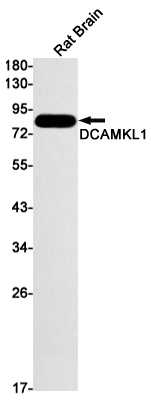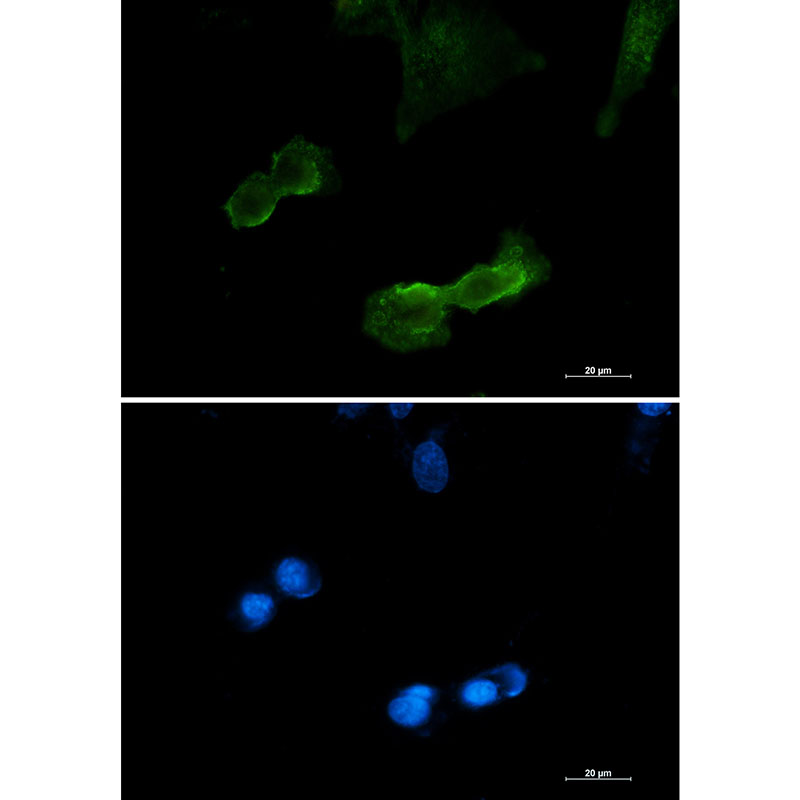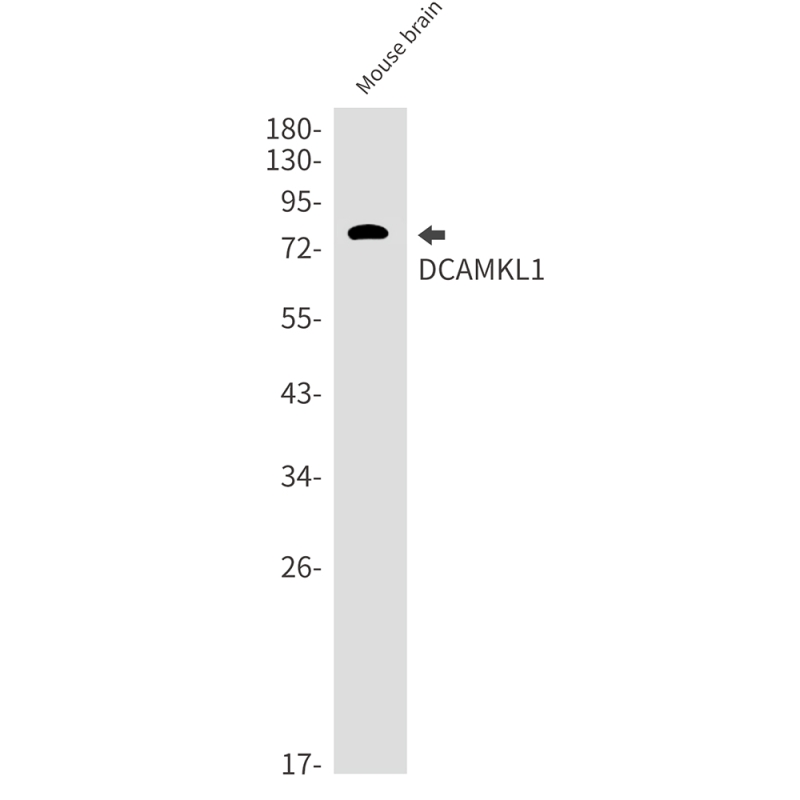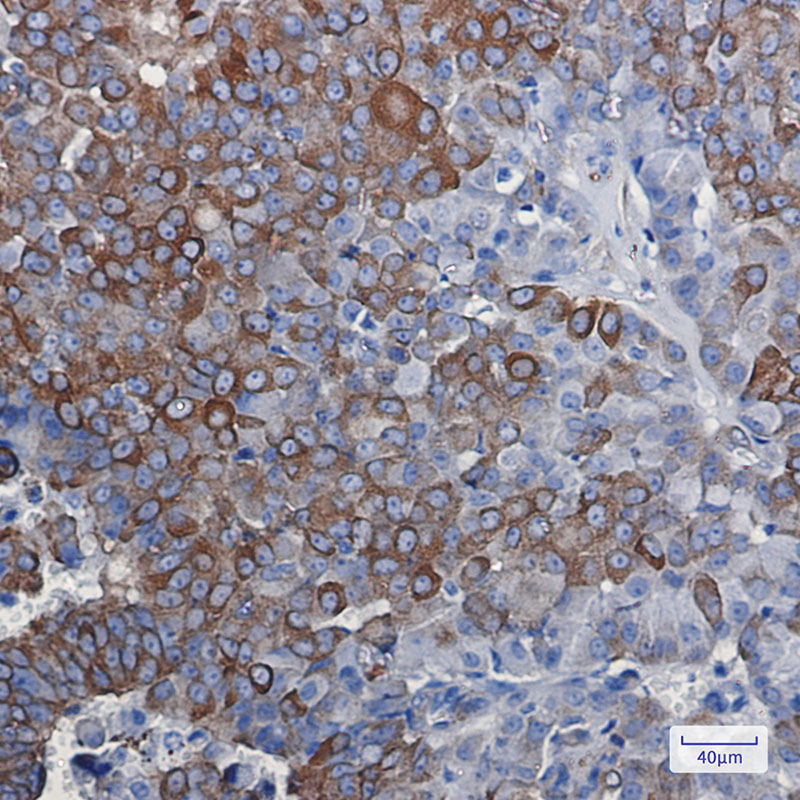



| WB | 咨询技术 | Human,Mouse,Rat |
| IF | 咨询技术 | Human,Mouse,Rat |
| IHC | 1/50-1/100 | Human,Mouse,Rat |
| ICC | 1/50-1/200 | Human,Mouse,Rat |
| FCM | 咨询技术 | Human,Mouse,Rat |
| Elisa | 咨询技术 | Human,Mouse,Rat |
| Aliases | doublecortin-like kinase 1; CL1; DCLK; CLICK1; DCDC3A; DCAMKL1 |
| Entrez GeneID | 9201 |
| WB Predicted band size | Calculated MW: 82 kDa; Observed MW: 82 kDa |
| Host/Isotype | Rabbit IgG |
| Antibody Type | Primary antibody |
| Storage | Store at 4°C short term. Aliquot and store at -20°C long term. Avoid freeze/thaw cycles. |
| Species Reactivity | Human,Mouse,Rat |
| Immunogen | A synthetic peptide of human DCAMKL1 |
| Formulation | Purified antibody in TBS with 0.05% sodium azide,0.05%BSA and 50% glycerol. |
+ +
以下是关于DCAMKL1抗体的参考文献示例(注:以下内容为示例,实际文献需通过学术数据库核实):
---
1. **文献名称**: "DCAMKL1 regulates intestinal stem cell identity and tumorigenesis"
**作者**: Westphalen CB et al.
**摘要**: 该研究利用DCAMKL1抗体鉴定肠道干细胞,发现DCAMKL1在维持干细胞特性中起关键作用,并证明其过表达与结直肠癌发生相关。
---
2. **文献名称**: "DCAMKL1 as a marker of quiescent pancreatic stem cells and oncogenic potential"
**作者**: Nakanishi Y et al.
**摘要**: 通过DCAMKL1抗体的免疫荧光染色,作者发现该蛋白标记胰腺中的静息干细胞,并在胰腺癌模型中验证其促肿瘤活性。
---
3. **文献名称**: "DCAMKL1 inhibition suppresses glioma progression via Wnt/β-catenin signaling"
**作者**: Li X et al.
**摘要**: 研究使用DCAMKL1抗体进行Western blot和免疫组化分析,证实抑制DCAMKL1可通过调控Wnt通路抑制胶质瘤生长。
---
4. **文献名称**: "DCAMKL1 expression in hepatocellular carcinoma: Correlation with prognosis"
**作者**: Wang L et al.
**摘要**: 通过DCAMKL1抗体的组织芯片分析,发现其在肝癌组织中高表达,且与患者不良预后显著相关,提示其作为潜在生物标志物。
---
建议通过PubMed、Google Scholar等平台,以“DCAMKL1 antibody”或“DCAMKL1 marker”为关键词检索最新文献。
The DCAMKL1 (Doublecortin and Calcium/Calmodulin-Dependent Kinase-Like 1) antibody is a tool used to detect the DCAMKL1 protein, a member of the serine/threonine kinase family. DCAMKL1 is encoded by the *DCLK1* gene and is primarily expressed in neuronal progenitor cells, stem cells, and certain epithelial tissues. It plays roles in neurogenesis, microtubule dynamics, and cellular differentiation, with its expression often linked to proliferating or immature cells. Research has highlighted its involvement in cancer biology, particularly in gastrointestinal cancers and brain tumors, where it serves as a marker for cancer stem cells (CSCs) and contributes to tumorigenesis, metastasis, and therapy resistance.
The DCAMKL1 antibody is widely used in immunohistochemistry (IHC), immunofluorescence (IF), and Western blotting to study tissue-specific expression patterns, cellular localization, and protein quantification. Its specificity is critical for distinguishing DCAMKL1 from its splice variant, DCLK2. which shares structural similarities but has distinct functional roles. Validated antibodies help elucidate DCAMKL1’s regulatory mechanisms in signaling pathways, such as Wnt/β-catenin and Notch, and its interaction with molecular partners like LIS1. Additionally, DCAMKL1-targeting antibodies are explored in preclinical studies for therapeutic applications, including antibody-drug conjugates (ADCs) or inhibitors to disrupt CSC populations. Proper validation using knockout controls or peptide blocking ensures antibody reliability in experimental models, from developmental biology to oncology research.
×